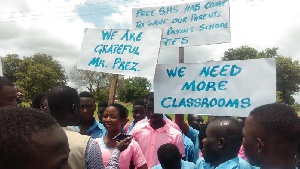Ghana’s educational system keeps undergoing evolution, adjustments and restructuring through key governmental policies since independence.
After 61 years of independence, one would expect that there is a stable and robust education system in place by now. Of course, we are all aware that change is inevitable and more so when it is triggered and tailored to accommodate the continuously growing population.
But it becomes more worrying when changes in our educational system in Ghana are being motivated and driven by erratic political paradigm shifts, capricious judgments on the part of politicians to satisfy their followers.
To remind ourselves of some the past educational policies that are tied to different political regimes, think about the Ghana School Feeding program, the Free Compulsory Universal Basic Education (FCUBE), the Teachers’ and Nurses’ Training Allowances, the change from the General Certificate of Education (GCE) Ordinary and Advanced (O & A) levels to the Junior High School (JHS) and Senior High School (SHS) respectively, the recursive dropping and introduction of new subjects every now and then at the junior high school level, the establishment of Vocational and Technical training institutes, the conversion of Polytechnics to Technical Universities, Scrapping and restoration of Research and Teaching allowances for University Teachers.
The list can be quite tall depending on your interest and emphasis.
I wish there was enough space to discuss each of these policies into details. But in summary, we are aware of the following concerning these major policies. Many basic schools in Ghana are still yet to be covered by the school feeding program, not to talk about the untimely release of funds to those that are already covered under the program. Can any Ghanaian confidently say that basic education in Ghana is entirely free through the FCUBE? Teachers’ and Nurse’ training allowances have become a “merry go round” between political parties.
Likewise, was the debate on whether senior high schools should be three or four years some time ago? We still cannot tell whether that debate has been put to bed. What about the recent call to revert our JHS & SHS back to the O & A level systems as well as the call for the reintroduction of some subjects that were scrapped from the JHS syllabus? There are still many basic schools in Ghana without a single computer but studying ICT.
I remember an ICT teacher becoming an international hero for teaching a Microsoft word on a blackboard. He deserves all the commendation and recognition but can anyone counts the number of teachers in his category who have been going through a similar hustle without any recognition?
Has the debate concerning the conversion of Polytechnics to Technical Universities and the future strategies of these institutions been clarified?
Can we say the citizenry of this country still hold the same prestige for our Vocational and Technical institutes? The Teaching and Research allowances for University teachers have sometimes become a tussle between the government and the UTAG. The immediate past government even proposed a Research Fund instead.
What messages do these historical trends in our educational policies convey as a country? Cleary we have not established any clear stable plan in our educational system from the basic to the tertiary levels.
We can say for a fact that most of our policies have not been thoroughly thought-through before their implementation. Most of these policies have not been stabilized and they continue to be subjects of national and political debates.
Now, here we are again with another major educational policy, the free SHS with its consequential double-tracking system staring at us.
I must admit that hopes were very high that the free SHS could be the panacea to achieving equality in our educational system between the rich and the poor.
However, since the emergence of the free SHS from the manifesto of the New Patriotic Party, NPP to the dawn of its implementation, the source of funding and its sustainability have been a subject of national and international interests.
The success of any major long-term policy is its sustainability. It is not surprising that the United Nation (UN) decided to replace the Millennium Development Goals (MDGs) that ended in 2015 with the Sustainable Development Goals (SDGs) that will run until 2030. The MDGs somewhat raised developing countries to some level of development and there was the need for those developments to be sustained and affirmed for which reason the SDGs were introduced.
It is only the visionless that would downplay the importance of the free SHS that started in September last year. If other countries specifically, in Africa, have done it and are reaping the benefits, why not Ghana? The benefits of the free SHS are boldly written for any forward-thinking person to see.
If there is still any doubt about this, let me highlight the United Nation’s SDG#4 that aims at ensuring inclusive and quality education for all in order to promote lifelong learning. The UN clearly, states in its SDG#4 that obtaining a quality education is the foundation for improving people’s lives and sustainable development.
However, the UN has noted that despite making a major progress towards increasing access to education, efforts are still needed to make even greater strides for achieving universal education goals.
Thus, despite the world achieving equality in primary education between girls and boys, only a few countries have achieved that target at all levels of education. I believe Ghana is close to achieving that target but we are definitely not one of those few countries that have achieved equality at all levels.
The free SHS is in line to help Ghana meet the targets under the SDG #4. It is giving equal opportunities in terms of access to education to both boys and girls, the rich and the poor at least to the second cycle.
It is therefore prudent that Ghanaians applaud the government for its foresight and the desire to make it work. I strongly believe that the free SHS rightly fall under the argument outlined under the SDG#4 and we must all embrace this policy as a country. In just a year of its implementation, it is estimated that 90,000 students who would have otherwise not made it to the senior high school are currently enrolled.
However, it looks like we have sold the ox before looking for a horse. We were haste in rejoicing without looking into the future of this policy. After almost a year of implementation, the question of sustainability keeps hovering around this all-important educational reform. Many questions were asked concerning the funding of the program by policy think tanks and many forward-thinking Ghanaians. The constant probing drew some answers from the government prior to the rollout of the program last year that is worth highlighting.
We were told initially that the source of funding for the free SHS was from the Heritage Fund. This was made known to the public by the Senior Minister, Hon. Yaw Osafo-Maafo at a forum in Accra sometime last year. The Heritage Fund was set up in 2011 under the Petroleum Revenue Management Act 815.
The Fund presently receives 8 per cent of Ghana’s annual petroleum excess revenue and the purpose for its establishment was to provide an endowment of support to the country’s future generations when the oil reserves are depleted. As at December 2016, the year prior to the implementation of the free SHS, the Fund had accrued to $262.57 million from the 8 per cent of total revenue from the oil proceeds.
The announcement by the Senior Minister received a lot of backlash especially from the opposition National Democratic Congress (NDC). While some members from the NDC claimed that a similar proposal from them was fiercely resisted by the NPP and for which reason they could not make such a proposal, others were of the view that the idea contravened the intended purpose for establishing the Fund.
Those who supported the use of the Fund for this policy believed that our SHS students now are the future generation. However, those who were against asked whether our oil reserves had depleted already.
The purpose of this article is not to debate this issue. The important question here is, Heritage Fund or not, were we in the position to see this policy through to the distant future as a country?
There were many projections and estimations about the potential cost of the free SHS when it becomes fully operational. I remember vividly the analysis that assuming the free SHS would cost Ghana US$ 600million yearly as projected by the head of economics of IMANI Ghana, then, of course, the Heritage Fund was clearly not enough to sustain it.
This meant that the government needed to supplement the implementation from other sources and that drew many worries. Ghanaians were all looking forward to the confirmation of the Senior Minister’s assertion during the budget statement by the Finance Minister last year. To our surprise, it happened not be the Heritage Fund but rather the Annual Budget Funding Amount (ABFA), another fund established under the same Petroleum Revenue Management Act.
The actual percentage of the total petroleum revenue allocated to the ABFA is determined annually by parliament and shall not exceed 70 per cent of the benchmark revenue.
In 2016, the ABFA receive 43 per cent of the petroleum revenue representing $1.47 billion. There was no doubt that that the ABFA is capable of funding the free SHS. However, the ABFA is part of the national budget that must be spent on priority sectors such as Agriculture, Industry, Environmental protection, Housing delivery, Security and public safety and of course Education.
That means earmarking nearly half of this fund to the implementation of the free SHS would lead to less fiscal space to cater for the other priority sectors in the economy. Another issue that was obvious was the huge infrastructural deficit at the SHS level that led to some schools threatening to cut down admission by 50%.
Nonetheless, considering the fact that the policy was one of the major campaign promises that made the current government very popular in the last general election, the government was bent on implementing the policy.
My fear at the start of this major policy was that as a multi-party democratic country, we do not expect one party to be in power forever.
The longest any party had ever stayed in government since the 1992 constitution is 8 years. This dynamics may change in the future but the reality is that one party cannot stay in power forever.
This means if there is no long-term sustainability plan about this policy, we may just be on our way to witnessing another major educational policy collapse in the near future.
The recent ad hoc measure to introduce a double-tracking system tells us that there was no long-term plans or roadmaps for sustaining this policy.
This was also envisaged when His Excellency, Nana Addo Dankwa Akuffo Addo was interviewed by GTV last year. The president was asked about how the free SHS will be financed following series of questions.
The answer to this question had been provided in the budget statement as highlighted above so there was no need for the question in the first place. However, the follow-up question caught my attention. It was about the sustainability of the free SHS going forward as a nation. The president’s response at the time quoting:
“I am saying we’ve made a commitment that we will begin 2017/2018 academic year to fund a free senior high school program. We have begun from the budgetary sources, a more efficient use of our resources. We have found the money to begin the process. I think if we’ve found the money to begin the process, you can count on us to find the money to sustain it. This matter is not and I kept saying and I want to repeat again, is not a political gimmick. It goes to the heart of our effort to develop our country. Unfortunately at this stage of our history, the numbers of people who should have had access to education but because of money cannot are much more than those who are able to enter the system. And we want to be able to assemble the Ghanaian human capital in all its diversity and multiplicity so that we can really make a good fist about growing our country”.
There was a bit of debate following a repetitive question about where the money would come from since the very budget that was being used to fund the policy had seen major tax cuts. The president stressed that the money will come from the Consolidated Fund, which he expects to grow with the removal of the nuisance taxes.
The demeanour and the confidence with which the President made these assurances showed his commitment to ensuring that the free SHS succeeds.
However, the concerns about the long-term sustainability were still uncertain from the President’s remarks. If the President said he found money to start its implementation and for that matter, the government could be trusted to find money to sustain it, perhaps he was right.
We gave him the benefit of the doubt although starting and sustaining a policy may be entirely different.
My question at the time was, what will happen if his government was no more? Can we trust any other government to sustain it just as President Nana Addo Danquah Akuffo Addo boldly declared? I was thinking about the National Health Insurance Scheme, the Free Maternal Health Care and the School Feeding Program. What about the Non-Formal Education Training, National Electrification Master Plan (NES), the Self-Help Electrification Project (SHEP), Community Day Schools, Affordable Housing Project.
I do not want to discuss how these policies fared as a result of political power shift. To summarize, these were policies started by one government and possibly collapsed or mishandled by another.
There is no evidence to suggest that policies started by one government are sustained or urgently pursued by another due to lack of national development plan and priorities.
I feared the free SHS could suffer a similar fate in the near future at the start of its implementation last year.
After almost a year into the free SHS, we are at the crossroads with challenges doubts of sustainability resurfacing.
The massive response of Ghanaians to the policy led to a massive enrollment at the senior high school last year. The pressure on infrastructural facilities means that there is the need for a quick fix. Fast forward, the double-tracking system proposed by Professor Jophus Anamuah-Mensah, the former Vice-Chancellor of the University of Education, Winneba is being adopted by the government.
There are serious implications of the double-tracking system, which will be analyzed later but once again opinions are very much divided between political parties and the various stakeholders in the educational sector. As a country, we are once again paying the cost for a very important but a rushed policy. At least, listening to the finance mister on CitiTV with Bernard Koku Avle suggests the policy needed more planning before its implementation last year.
The future of this country is at stake when it comes to the second cycle education. If the government that campaigned and won power on such an important policy is struggling to find proper instruments to implement it then your guest is as good as mine when the government is changed in the future.
This country must begin to look beyond the political lenses in our initiation implementation and sustenance of beneficial national policies. This is why there have been persistent calls for a national development plan.
The free SHS is a key policy that will benefit all Ghanaians at this stage of our development. We need to prioritize it and shun the unnecessary “we told you so” chanting. Let us not watch this policy collapse.
The road to our development after 61 years of independence has been too bumpy and it is about time we straighten things up as a country. Until we begin to plan, prioritize and implement our common goals together as a nation, the situation where beneficial national policies collapse or become obsolete due to changes in government could be staring at our faces once again. Let’s rise up!









![Sulley Muntari [L] and Michael Essien Sulley Muntari [L] and Michael Essien](https://cdn.ghanaweb.com/imagelib/pics/861/86144189.295.jpg)









